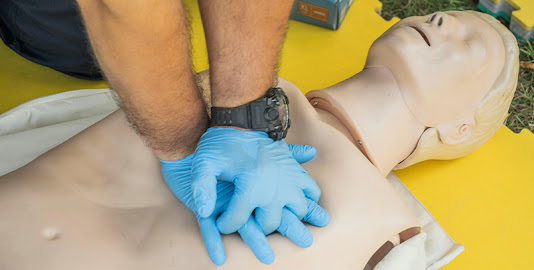Cardiopulmonary resuscitation (CPR) is a lifesaving technique that everyone should know. Being able to perform CPR can mean the difference between life and death for someone experiencing sudden cardiac arrest. Unfortunately, statistics show that less than half of Canadians have up-to-date CPR training. This article will provide an overview of CPR Training Winnipeg and discuss why it’s so important for more people to develop this critical skill.
What is CPR and Why is it Important?
CPR stands for cardiopulmonary resuscitation. It is an emergency procedure performed when someone's breathing or heartbeat has stopped. CPR involves chest compressions to manually pump blood through the body and rescue breaths to provide oxygen. Timely CPR can double or even triple chances of survival after cardiac arrest. The first few minutes are the most critical. Even basic CPR skills used immediately after cardiac arrest can be lifesaving before emergency responders arrive.
Who Should Learn CPR?
Ideally, everyone should learn CPR Courses Winnipeg. You never know when you might encounter someone - a family member, friend, coworker, or stranger - needing emergency assistance. According to the Canadian Resuscitation Institute, immediate CPR can increase survival rates by up to 75% compared to no intervention. Just picture how many lives could be saved if more members of the Winnipeg community were empowered to provide this type of first aid.
Where to Take a CPR Course in Winnipeg
If you live in Winnipeg and want to learn CPR, fortunately there are many options. Here are some of the top providers offering convenient CPR and automated external defibrillator (AED) training:
Canadian Red Cross
As part of the International Red Cross and Red Crescent network, the Canadian Red Cross has a 130-year history of providing humanitarian aid and emergency training programs. They offer CPR/AED courses for infants, children, and adults. Flexible online and in-person class options fit different schedules and learning styles.
Winnipeg Fire Paramedic Service
What better teachers than the first responders themselves? Winnipeg Fire Paramedic Service provides CPR/AED Training Winnipeg for community members aged 12 and up. Their classes cover techniques tailored for infants, children, and adults needing emergency care.
Heart and Stroke Foundation
As a leading funder of lifesaving heart disease and stroke research, the Heart and Stroke Foundation also educates Canadians on prevention and emergency response. They provide CPR training for healthcare providers as well as community members. Infant, child, and adult techniques are covered.
Why Get Trained in Winnipeg?
High concentrations of people with up-to-date CPR skills can make entire communities more resilient when cardiac emergencies occur. Although anyone can experience sudden cardiac arrest, certain risk factors are more prevalent among Winnipeg’s population.
These include long winter months where people are less active, high cholesterol levels, smoking, and obesity. Equipping more people with skills to perform chest compressions, clearing airways, using AEDs, and more can save lives right here at home.
CPR Course Format Options
Standard CPR courses Winnipeg take just a few hours to complete. The Red Cross and Heart and Stroke Foundation have convenient online components that teach the knowledge content, followed by in-person skills practice and evaluation. This blended format provides flexibility to learn on your schedule, then attend a session with an instructor on a date of your choosing. The Winnipeg Fire Paramedic Service offerings are traditional classroom-based courses.
No matter which type of course you select, expect to cover core learning objectives like:
- Recognizing signs and symptoms of heart attack, cardiac arrest, stroke, and choking
- Calling emergency responders
- Opening airways
- Rescue breathing
- Chest compressions for circulation
- Defibrillator use
- Relief for choking victims
Hands-on practice time also prepares you to provide CPR confidently in a real emergency. Courses tailor instruction for adults as well as infants and children needing different techniques based on their body size and maturity.
CPR Training for Healthcare Professionals
CPR-certified healthcare providers are critical in hospitals, care homes, clinics and more. But even healthcare workers need occasional refreshers as guidelines get updated. Convenient online supplemental training can help Winnipeg-area clinicians maintain their lifesaving skills.
For example, the Heart and Stroke Foundation offers healthcare provider eCPR renewal courses. Designed specifically for professionals already CPR-certified, these offerings provide annual skills review and updated protocol instruction compliant with 2020 guideline changes. eCPR training gives nurses, physicians, EMTs, and other clinicians flexibility to refresh knowledge on their own schedules.
Staying Up-to-Date
Regardless of whether you learn CPR as a healthcare provider or a community member, it is important to maintain your skills over time. Refresher training every one to two years is recommended to review techniques and practice protocols as cardiac emergency response guidelines get updated. Apps and other tools also exist to help retain knowledge between hands-on courses.
Expanding CPR Training in Schools
An important opportunity exists for expanded CPR training Winnipeg schools. Teaching these lifesaving skills to students delivers huge community benefits over the long term. Just as children learn the fundamentals of reading, writing arithmetic, and more in school, CPR preparation can become a standard part of the curriculum.
The American Heart Association reports that CPR training in schools dramatically increases bystander intervention and survival rates where cardiac arrest occurs. Students become empowered to help someone in distress. Plus they can bring skills home to teach family members. Integrating CPR instruction for secondary students and offering continuing education opportunities delivers measurable public health impacts. It is a wise investment that pays dividends for decades to come.
Final Words
We all have a responsibility to be prepared to take action in medical emergencies until professional help can arrive. Learning CPR Training Winnipeg is one skill that could save the life of someone you love. Look into convenient and affordable training courses available right around Winnipeg taught by qualified instructors. Just a few hours of your time is a small investment to be empowered to provide care when seconds count. Together through education, we can build a more resilient community ready to help one another in times of greatest need.







.jpg)
.jpg)




